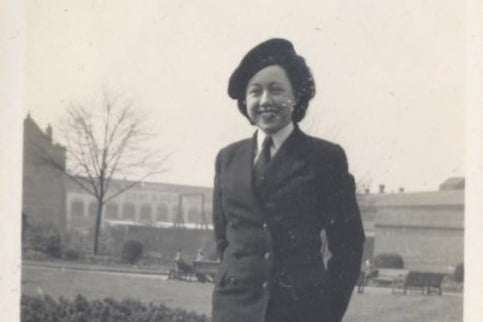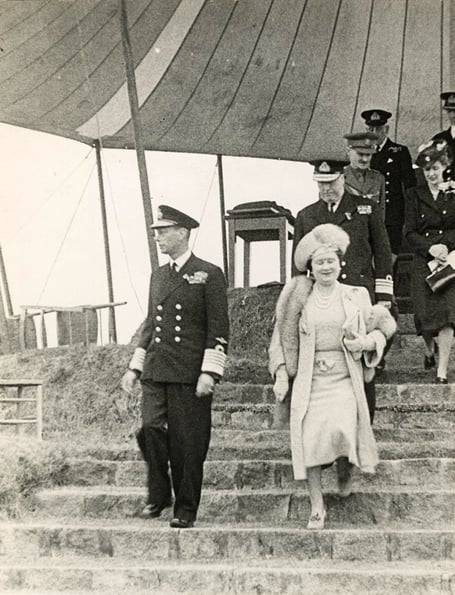In her letter of July 2, written 80 years ago this week, Wren Kathleen Oates was pretty much on an even keel, quite resigned to her leave having been delayed by the forthcoming visit of their ‘Britannic Majesties’, as she put it. She fully planned to leave the Isle of Man for home on Monday July 9, the following week, when the Royal visit was safely over. ‘I think my VE leave it’s pretty definite – it’s been signed and sealed – I’ll send postcards Saturday so that you know definitely.’
She began her letter in the early hours of the morning from the Ronaldsway Control Tower. ‘One o’clock Monday morning! A funny time to write to you – I expect you are all in bed fast asleep!’ Not unexpectedly, she did grumble a bit about her Night Flying duty. ‘I’m annoyed about tonight – there’s only one squadron flying and it seems a waste of time to be up here. They’re doing anti-submarine bombing, and each flight takes about an hour. We are due to finish about 2:30a.m., but as the first aircraft were about half an hour late taking off, I think I’ll be lucky if I’ve finished by 3:30! Letter writing helps to keep my mind active and so I feel less sleepy.’
But the planning for Royal visit was definitely providing an interesting distraction. ‘This morning, we had Divisions and a practice for next Friday [July 6] when the king comes. The Marine band turned out in full dress regalia – the whole affair was very amusing! We even practised the three cheers which we give the King as his aircraft takes off down the runway.’
She went on to describe the Royal itinerary. ‘Tynwald day will be the high spot of the visit – that’s Thursday, I believe. The ceremony is going to be broadcast in the morning I think, so listen in and save all newspaper cuttings! Tynwald day is the day of the year when all the laws of the island are read aloud to the people from Tynwald Hill. This is located halfway to Peel in about the centre of the island; I’d love to go, but transport is the one difficulty.’
Kathleen’s family had forwarded a letter from her recently married cousin Arthur, a Lieutenant stationed near Luxembourg. He wrote that, ‘apart from the pleasant scenery there is very little else to comment on. The Germans themselves, we cannot talk to, except on official business and I think it’s a good idea too - whatever one hears about fraternisation. So I for one am against it. These people have caused enough trouble for the last 30 years.’ Kathleen commented, ‘I note, with amusement, as a respectably married man, he is strictly against fraternisation! However, I agree with him – I think the Germans need treating as conquered people.’

She then went on to give news of her doings over the weekend. ‘Saturday [June 30], there was very bad weather’, so with sunbathing and swimming off the agenda, she travelled to Douglas for shopping. ‘I spent a slipper chit which one of the girls gave to me and bought myself a new pair in Douglas. They were terribly difficult to buy – I couldn’t get a size 5 1/2. I paid 15 shillings and sixpence, which seems rather a lot for slippers.’
This brought to mind the dress material which she had bought and sent to her sister Dorothy for her birthday at the end of June – which had been rapturously received at home in Leicester. Kathleen warned her that this could well be the end of her family benefitting from Forces privileges in this area. ‘I’m afraid it’s the last you’ll get from the Wrens owing to the new chit system.’
By July 1, the weather had improved. ‘This afternoon was lovely and sunny. Cynthia and I walked out to Langness point, found sheltered crannies in the rocks, stretched out in the sunshine and almost slept. I like Sunday because it’s the one day on which we get a rest from the roar of Barracuda engines!’ Her sentiment about the noise of the Barracudas was shared by many civilians. The Isle of Man Times had commented in early July 1945, ‘Many of us, when we toss about in our beds tonight, kept awake by the roar of powerful Barracuda engines, are tempted to wish these men were out of the Isle of Man and in a place not shown on the map.’ (It should be noted, however, that the newspaper then went on to conclude that ‘we pull ourselves together and ask what the breaking of our sleep is worth compared with the achievement of victory and the defeat of a desperately cruel and lustful aggressor.’)
But Kathleen was not troubled by noise when working. The letter continued with a happy note at 1:45am ‘corn beef sandwiches are now being distributed – anything to eat is welcome!.’
And she was still scribbling home at 2 am: ‘We’ve still six more aircraft to take off, and as they go in pairs and take an hour, that makes another three hours!’.
She added a note that evening, after her second bout in the Control Tower. ‘I’m feeling rather tired now – heavy eyed – we finished about 4:30 this morning, then I was on again at 10 o’clock till 5:30 this evening. Admiral Air was expected just as I was leaving. His is a new appointment and I expect he’s making a tour of all the Naval Air Stations. We are now the Naval Air Arm and not the Fleet Air Arm!’. Admiral Air was actually a nickname for the US Navy's Pacific Fleet commander, Admiral Chester Nimitz, who directed all Allied air, land, and sea forces in the Pacific. Important visitors were coming to the Isle of Man.


.jpeg?width=209&height=140&crop=209:145,smart&quality=75)
.jpeg?width=209&height=140&crop=209:145,smart&quality=75)
.jpg?width=209&height=140&crop=209:145,smart&quality=75)